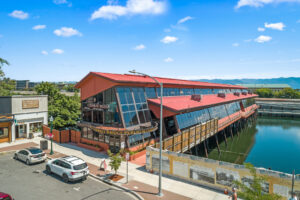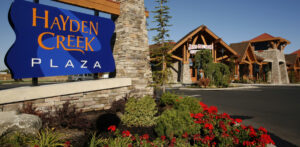I constantly have clients, even well versed clients, ask me what the benefits of companies doing a sale-leaseback is and it was always about cash flow. This article from Costar is wonderful at explaining how tax alterations in commercial real estate can have a ripple effect across commercial real estate. Check out the article below, which I had to copy and paste, since Costar is a paid membership
FEBRUARY 13, 2019 | LOU HIRSH
Check, Please: Restaurant Chains Jump on Leaseback Deals to Raise Capital
New Tax Rules Spur Equity-Capturing Practice
Chili’s is among several national restaurant chains selling their stores then leasing the space back as tenants. Photo: Mike Mozart, flickr
Some major chain restaurants across the country are selling their real estate and leasing the space back, investing the equity in their businesses as they adjust to a tax law change that trims deductions on owned property.
In the past six months alone at least $500 million in restaurant sale-leaseback deals, involving national chains such as Chili’s, Pizza Hut and Outback Steakhouse, were signed across the United States, according to figures disclosed by the firms. Prominent retail store chains, including grocery stores, also have been selling and leasing back multiple U.S. locations in recent years.
“The sale-leaseback market is growing as corporations and particularly restaurant franchisees become more aware of the unused power their real estate holds,” said Reed Melillo, senior director in the Los Angeles office of brokerage firm James Capital Advisors.
Melillo noted that sale-leasebacks allow restaurant operators to recapture capital that they’ve invested into their real estate, and put it toward other areas of their business, including opening new locations, remodeling their eateries or paying down debt. The restaurant operator can also negotiate rent terms that are affordable in the long run under the new building owner.
James Capital Advisors, for instance, during the past year represented several of the largest U.S. franchisees of Pizza Hut — owned by Louisville, Kentucky-based Yum! Brands Inc. — in sale-leaseback transactions. Most recently, it handled about $35 million in sale-leasebacks involving 31 locations of New York-based franchisee Grand Mere Restaurant Group, as part of a larger $60 million financing package involving 82 Pizza Huts in seven Western and Midwestern states. Pizza Hut, meanwhile, announced plans to expand internationally last year and is focused on growing its beer delivery service in the United States.
In addition to paint retailer Sherwin-Williams and convenience-store operator 7-Eleven, store chains taking the sale-leaseback route during the past year included supermarket owners Supervalu and Albertsons. The practice was deployed several years earlier by Sears Holdings, owner of Sears and Kmart.
While the sale-leaseback phenomenon isn’t new, the stage is set for further growth of such deals following recent changes in tax laws.
Brokerage firm Marcus & Millichap noted in a 2018 report that changes in federal tax rules, among other factors, have encouraged a growing number of retail and restaurant owners to pursue sale-leaseback deals, especially as the overall retail climate has become more challenging.
Prior to tax changes that took effect in early 2018, some business owners preferred to lock in costs by purchasing the real estate in which they operate, and tax laws allowed them to deduct all interest expenses related to those building purchases.
Reduced Deductibility
When the tax laws changed, that interest deductibility — for companies with annual gross receipts of more than $25 million — was reduced to an amount representing no more than 30 percent of earnings before taxes, depreciation and amortization.
“As a result, businesses may shift strategies and sell the real estate in which they operate to investors and lease it back from them,” the Marcus & Millichap report said, noting this move essentially eliminates the interest expense tied to a mortgage. The cost then becomes a lease expense, which generally remains fully deductible.
Marcus & Millichap noted that as long as U.S. single-tenant retail vacancies remain at historically low levels, as they did in 2017 and 2018, and new retail development remains relatively scarce amid rising rents, a diverse pool of investors is likely to be attracted to sale-leaseback arrangements.
The main benefit for the investor, Melillo said, is that rent and lease terms are structured based on a restaurant’s actual, historical operating metrics, rather than a restaurant forecast or the development cost on a new building. “When you purchase a sale-leaseback, you typically know that the restaurant has some operating history at the location and that the business can support the rent being paid,” Melillo said.
The industry has had several other big deals. Recently announcing earnings for its second quarter ended Dec. 26, Dallas-based Brinker International Inc. — operator of brands including Chili’s and Maggiano’s Little Italy — reported $458 million in proceeds from sale-leaseback transactions.
In one of the largest of those deals, Mill Valley, California-based Four Corners Property Trust, a restaurant-focused real estate investment trust, announced in August an agreement to acquire up to 48 Brinker-operated Chili’s for a purchase price of almost $156 million.
In late January, Four Corners announced the $3.9 million sale-leaseback acquisition of a New Mexico location of Outback Steakhouse, a brand owned by Tampa, Florida-based Bloomin’ Brands Inc., from San Diego-based franchisee Cerca Trova Restaurant Concepts Inc.
Among the big investor incentives, Four Corners officials noted that in both the Chili’s and Outback deals, rents are scheduled to increase 10 percent every five years during the initial term.





